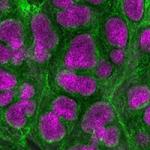
Research Topics
Cells of the body are decorated with a variety of carbohydrates (sugars) that serve diverse functions. Alterations in the presence of these sugars are associated with a number of human diseases, including familial tumoral calcinosis and various cancers. To better understand how alterations in glycosylation contribute to disease onset and progression, Dr. Ten Hagen’s group studies how sugar addition (O-glycosylation) is regulated and how it influences basic biological processes. Using Drosophila models, the group has demonstrated that O-glycosylation is an essential modification that is required in specific cells and tissues during development. Current research is directed at further defining the role this protein modification plays in secretion, secretory vesicle formation, cell adhesion, and cell signaling in both Drosophila and mammals. Ultimately, the aim is to elucidate how O-glycosylation regulates key cellular processes during development and disease.
Biography
Dr. Kelly Ten Hagen received a B.S. from Cornell University (with distinction and honors) and earned a Ph.D. in genetics at Stanford University. Dr. Ten Hagen is an elected Fellow of the American Association for the Advancement of Science (AAAS) and the American Society for Biochemistry and Molecular Biology (ASBMB). She received the Rosalind Kornfeld Award for Lifetime Achievement in Glycobiology and was selected for the Irwin J. Goldstein Lectureship. Dr. Ten Hagen has served as an editorial board member for The Journal of Biological Chemistry and for Glycobiology. She was a member of the Board of Directors for the Society for Glycobiology and served as a Council Member for the ASBMB. She is currently on the Board of Reviewing Editors for eLife. She has previously served on the NIH Central Tenure Committee and the NIH Board of Scientific Directors. Dr. Ten Hagen’s research advances our understanding of the molecular, cellular and organismal impact of protein glycosylation and how aberrations in this conserved modification lead to disease.
Selected Publications
- Zhang L, Muirhead KJ, Syed ZA, Dimitriadis EK, Ten Hagen KG. A novel cysteine-rich adaptor protein is required for mucin packaging and secretory granule stability in vivo. Proc Natl Acad Sci U S A. 2024;121(6):e2314309121.
- Syed ZA, Zhang L, Tran DT, Bleck CKE, Ten Hagen KG. Regulated Restructuring of Mucins During Secretory Granule Maturation In Vivo. Proc Natl Acad Sci U S A. 2022;119(43):e2209750119.
- Zhang L, Mann M, Syed ZA, Reynolds HM, Tian E, Samara NL, Zeldin DC, Tabak LA, Ten Hagen KG. Furin cleavage of the SARS-CoV-2 spike is modulated by O-glycosylation. Proc Natl Acad Sci U S A. 2021;118(47).
- Tian E, Wang S, Zhang L, Zhang Y, Malicdan MC, Mao Y, Christoffersen C, Tabak LA, Schjoldager KT, Ten Hagen KG. Galnt11 regulates kidney function by glycosylating the endocytosis receptor megalin to modulate ligand binding. Proc Natl Acad Sci U S A. 2019;116(50):25196-25202.
- Ji S, Samara NL, Revoredo L, Zhang L, Tran DT, Muirhead K, Tabak LA, Ten Hagen KG. A molecular switch orchestrates enzyme specificity and secretory granule morphology. Nat Commun. 2018;9(1):3508.
Related Scientific Focus Areas

Molecular Biology and Biochemistry
View additional Principal Investigators in Molecular Biology and Biochemistry



This page was last updated on Wednesday, March 26, 2025